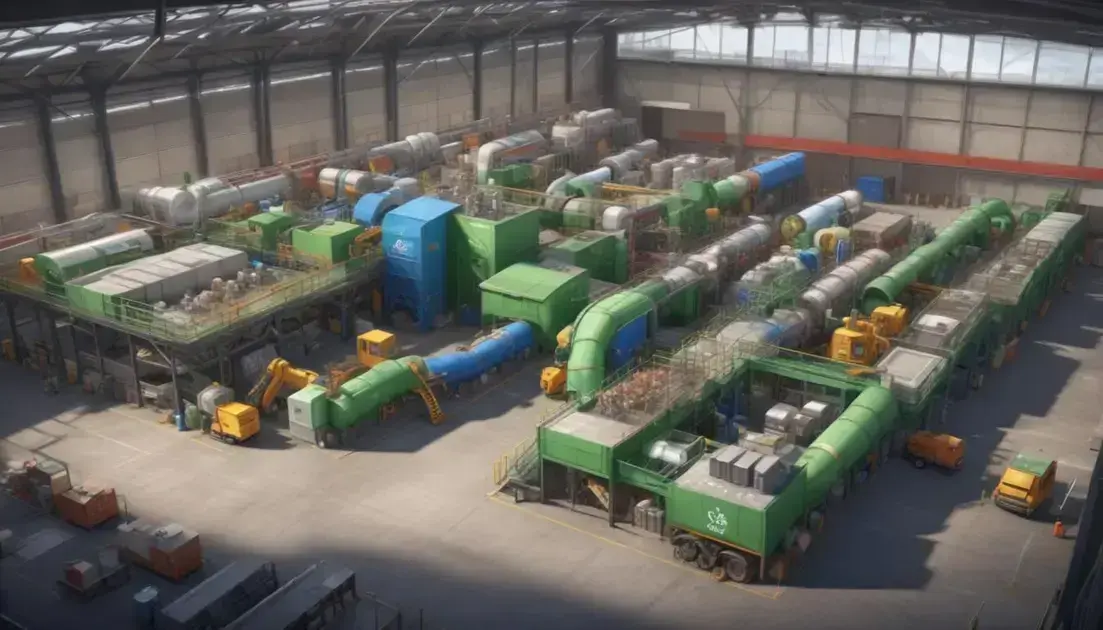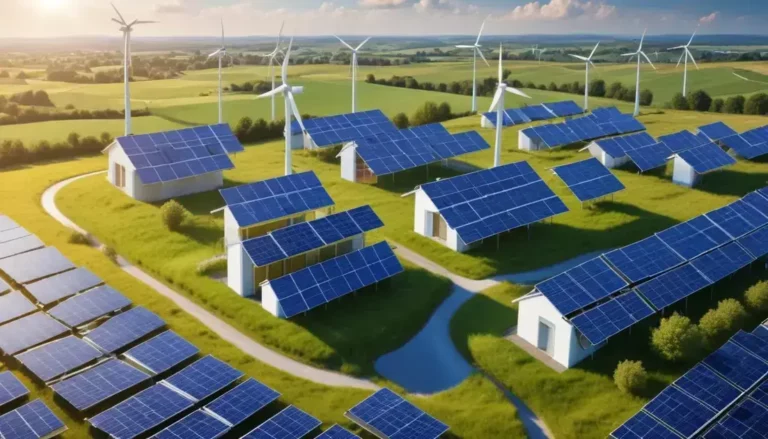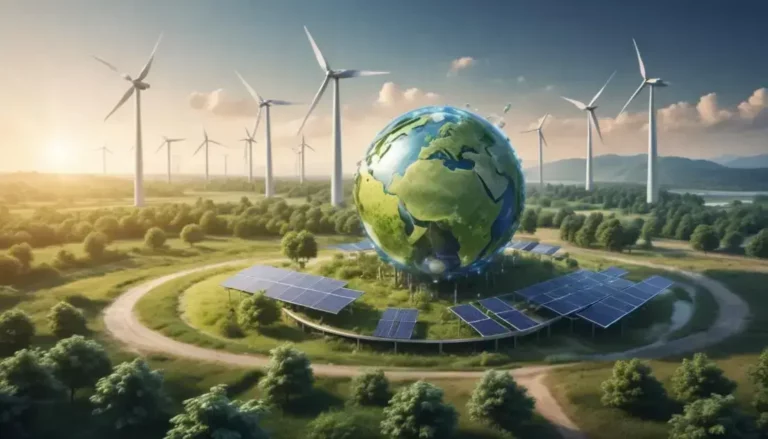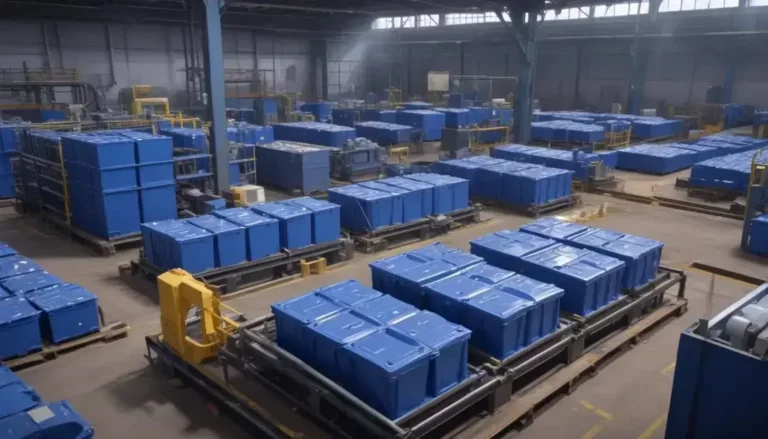How Vattenfall is Transforming the Recycling Industry
Recycling involves the process of converting waste materials into reusable products, playing a critical role in reducing environmental impact and promoting sustainability through practices such as energy efficiency, community engagement, and the adoption of a circular economy.
Recycling plays a crucial role in sustainability. However, the industry faces challenges in energy supply, especially with rising costs. Recycling is not just about processing materials; it’s about creating a sustainable future. What if innovative energy solutions could change the game?
The challenges of the recycling industry
The recycling industry faces numerous challenges that hinder its ability to operate efficiently and sustainably. One significant issue is the fluctuating costs of energy, which directly impact the operational expenses of recycling facilities. As demand for recycled materials increases, so does the need for reliable and affordable energy sources.
Moreover, outdated infrastructure in many recycling plants can lead to inefficiencies and increased waste. Upgrading to modern technologies requires substantial investment, which can be a daunting move for many companies. Establishing a balance between cutting-edge equipment and cost-effectiveness is crucial.
Adopting sustainable practices is another challenge, particularly as regulations tighten. The industry must continually adapt to new rules governing waste management and carbon emissions. This adaptation often requires innovative solutions that can be costly and complex.
Lastly, public awareness and participation are vital for the success of recycling initiatives. Many people remain unaware of the importance of recycling or how to correctly sort materials. Addressing these challenges is essential for the recycling industry to thrive and contribute to a more sustainable future.
Understanding energy consumption in recycling
Understanding energy consumption in recycling is essential for improving efficiency and reducing costs. Recycling processes, from collection to processing, require significant amounts of energy, which can vary widely depending on the materials involved. For instance, plastic recycling often requires more energy than metal recycling due to the complexities in processing different types of plastics.
One way to address these energy challenges is through the implementation of renewable energy sources, such as solar or wind power. By transitioning to these sustainable energy options, recycling facilities can reduce their reliance on fossil fuels and lower their overall carbon footprint. This shift not only helps the environment but can also lead to cost savings in the long run.
Moreover, advancements in technology are contributing to more energy-efficient recycling processes. Innovations such as AI-driven sorting systems can optimize material separation, reducing energy waste. As the sector evolves, integrating these technologies becomes crucial for meeting sustainability goals.
Training and educating staff on energy efficiency practices further enhances the potential for savings. Simple changes in operational procedures can lead to significant reductions in energy consumption, making the recycling process more environmentally friendly.
Benefits of Independent Distribution Network Operators
Independent Distribution Network Operators (IDNOs) play a crucial role in enhancing the efficiency of the recycling industry. One of the primary benefits of IDNOs is their ability to provide tailored energy solutions. By operating independently from traditional energy suppliers, IDNOs can offer customized pricing and service packages that better meet the needs of recycling facilities.
Moreover, IDNOs facilitate competition in the energy market, driving down costs for recyclers. With multiple options available, recycling plants can choose the most cost-effective provider, promoting innovation and efficiency within the industry.
Another significant advantage is the improved reliability and resilience of energy supply. IDNOs often utilize advanced technology to manage energy distribution, which can result in more stable and predictable energy availability. This reliability is vital for recycling operations that depend on consistent energy to process materials efficiently.
Furthermore, IDNOs are generally more adaptable to sustainability initiatives. They are better positioned to integrate renewable energy sources and energy-efficient technologies, helping recycling facilities reduce their carbon footprint while optimizing energy use. By leveraging the advantages of IDNOs, the recycling sector can move towards a more sustainable and economically viable future.
Cost-effective solutions for energy needs
Finding cost-effective solutions for energy needs is paramount for the recycling industry. As energy costs continue to rise, recycling facilities must identify strategies that optimize energy consumption without compromising operational efficiency. One approach is to invest in energy-efficient technologies. Upgrading machinery and equipment can lead to significant energy savings over time, allowing facilities to operate more sustainably and profitably.
Another effective solution involves conducting regular energy audits. By assessing energy use patterns, facilities can pinpoint areas of waste and implement targeted changes. These audits help in identifying inefficiencies and allow for better management of energy budgets.
In addition, facilities can explore the use of renewable energy sources such as solar or wind power. By integrating these sustainable options into their energy mix, recycling plants can reduce dependency on traditional energy suppliers and hedge against price fluctuations. This not only cuts costs but also aligns operations with green initiatives.
Collaborating with Independent Distribution Network Operators (IDNOs) can also provide tailored energy solutions. These operators often offer flexible pricing models and innovative technologies that can further drive down costs while enhancing energy supply reliability.
Strategies for sustainability in recycling operations
Implementing effective strategies for sustainability in recycling operations is vital for minimizing environmental impact. One fundamental approach is the adoption of a circular economy, where materials are reused and recycled indefinitely. This reduces waste and ensures that resources are being utilized efficiently throughout their lifecycle.
Moreover, recycling facilities should prioritize eco-friendly technologies. Innovations such as advanced sorting systems can improve material recovery rates, ensuring that more recyclable materials are processed correctly. This not only enhances productivity but also contributes to environmental conservation.
Training staff on sustainable practices is equally important. Empowering employees with knowledge about waste management and environmental guidelines can lead to more conscientious work habits. Regular workshops and training sessions can help keep the team informed about the latest sustainability practices.
Additionally, forming partnerships with community organizations can create awareness and encourage public participation in recycling initiatives. Engaging the community helps to expand the recycling network and enhances overall effectiveness. By combining technological advancements with community involvement, recycling operations can significantly boost their sustainability efforts.
In Conclusion: Embracing Sustainable Recycling
Understanding the importance of sustainability in recycling operations is crucial for building a better future. By adopting innovative technologies and strategies, recycling facilities can significantly reduce their environmental impact.
Solutions such as energy efficiency practices, collaboration with Independent Distribution Network Operators, and community engagement enhance both productivity and sustainability. The push towards a circular economy is essential for making the most of our resources.
As the recycling industry continues to evolve, organizations must remain committed to implementing these sustainable practices. This commitment not only benefits the environment but can also lead to economic advantages. By investing in sustainability, recycling operations can thrive while contributing to a healthier planet.
Ultimately, staying informed and proactive about these developments will help create a more sustainable and efficient recycling system for everyone.
Frequently Asked Questions
What are the main challenges facing the recycling industry today?
The recycling industry faces challenges such as fluctuating energy costs, outdated infrastructure, and the need for public awareness about the importance of recycling.
How can Independent Distribution Network Operators benefit recycling facilities?
IDNOs offer tailored energy solutions and competitive pricing, helping recycling plants reduce costs and improve energy reliability.
What role does technology play in making recycling more sustainable?
Technology helps improve efficiency through advanced sorting systems, energy management solutions, and innovative recycling processes that reduce waste.
How can communities get involved in recycling initiatives?
Communities can help by participating in recycling programs, spreading awareness, and collaborating with local recycling facilities to improve overall effectiveness.
What are some effective strategies for reducing energy consumption in recycling?
Regular energy audits, investing in energy-efficient technologies, and integrating renewable energy sources are effective strategies for reducing energy consumption.
Why is a circular economy important for recycling operations?
A circular economy promotes continuous reuse and recycling of materials, reducing waste and ensuring that resources are used more efficiently throughout their lifecycle.






